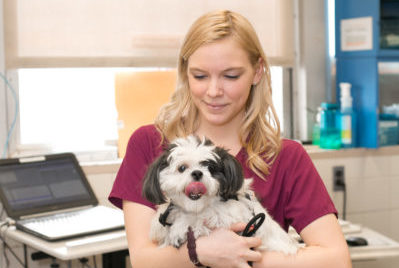Treating Your Pet’s Minor Injuries at Home

Treating Your Pet’s Minor Injuries at Home
With the advent of nice weather, more people and more pets are spending time outdoors. Fresh air and exercise do wonders for everyone, but a day outdoors can result in a minor injury for your furry companion. Pet families might be tempted to open their medicine chest to treat a seemingly minor condition themselves, but be careful: the result could be disastrous.
Safe home therapies
While you might not think of a bath as therapeutic, after a busy day outdoors, a bath will remove dirt and grime from cuts and scratches. The added benefit of shampooing your dog is that you will also find any attached ticks. If a paw is sore, chafed or has a small cut after a hike, a full bath might not be necessary, but soaking the paw(s) in Epsom salts can be very soothing. Don’t let your pet drink Epsom’s salts because they can cause diarrhea. If the injury is not amenable to soaking, say a cut or scrape on the back, wet a washcloth in warm water (with or without Epsom’s salts) and use it to clean and compress the area.
For oozy and moist skin lesions, Domboro’s solution, found in the first aid section of your local pharmacy is gentle and drying to moist spots on the skin when used according to the label directions. Don’t overdo the Domboro’s solution though, as drying the skin out completely is not good.
For itchy or runny eyes, you can wash the eye lids using 1 drop of no-more-tears baby shampoo in 1 cup of warm water. Premoistened eyelid wipes, available at pharmacies are also safe for pets. Red eyes should never be treated at home, because a red eye can indicate glaucoma or a corneal ulcer which need immediate professional attention.
Dangerous home therapies
While many human medications work well in pets, others can be lethal. Never administer any prescription or over the counter medications to your pet without approval from your veterinarian. Nonsteroidal anti-inflammatory drugs (NSAIDs) are especially deadly. Ibuprofen, naproxen and similar drugs are a big no-no for pets. One tablet can cause a serious bleeding ulcer in your dog or permanent kidney damage. Acetaminophen seems safe since it is commonly given to babies, but one dose can land your cat in ICU. The effects of acetaminophen are wide ranging in cats and include a swollen head, liver damage and red blood cell damage.
Because medications safe in humans may be deadly in animals, keep the Pet Poison Hotline [800-213-6680] or ASPCA Animal Poison Control [888 426-4435] numbers nearby in case your pet accidentally ingests medications.
Remedies that seem like a good idea, but could be detrimental
I would be certain that every medicine cabinet contains a brown bottle of peroxide. Many use it to clean wounds. Hydrogen peroxide can be irritating and may actually slow wound healing in both pets and humans, so I would stick with soap and water for most cuts and scrapes. Neosporin is pet-safe, but most pets don’t like ointments on their skin. I find most want to lick the ointment off, which delays healing and promotes infection.
If being outdoors leaves me tired and achy, I get out the heating pad. There are two risks here for pets. First, the heating pad can burn if your pet is unable to get up and move off the pad due to an injury. The cord of the heating pad is also readily available for chewing, which can cause electric shock. Try a microwavable heating disc instead.
Enjoy the nice weather and spend time outdoors with your pet, just take care when using any home remedies in your pet.






























